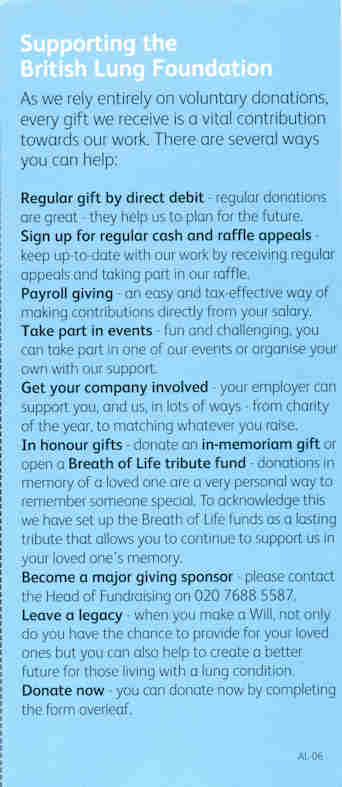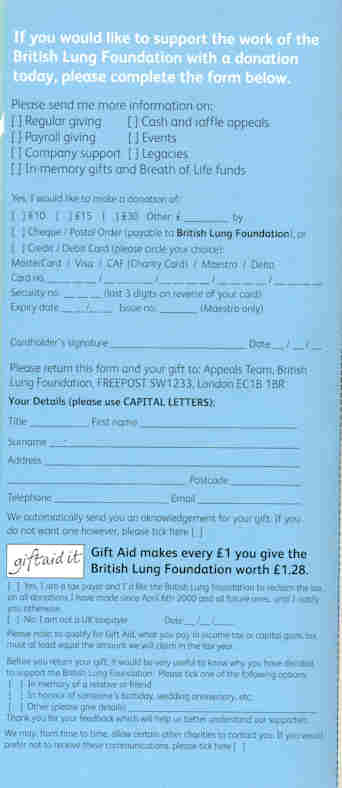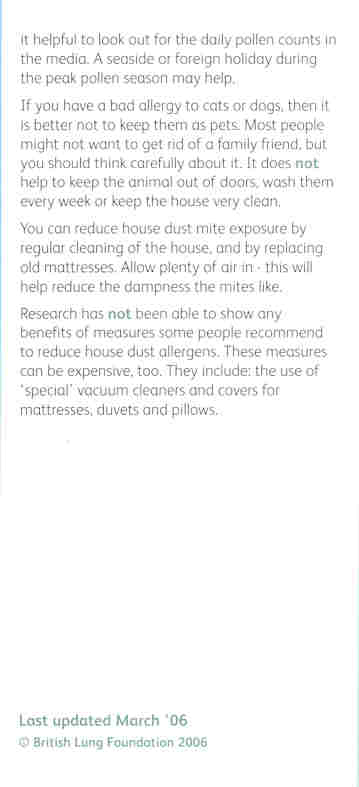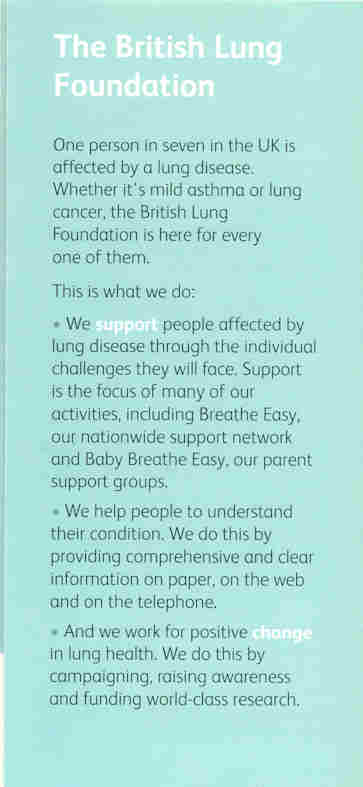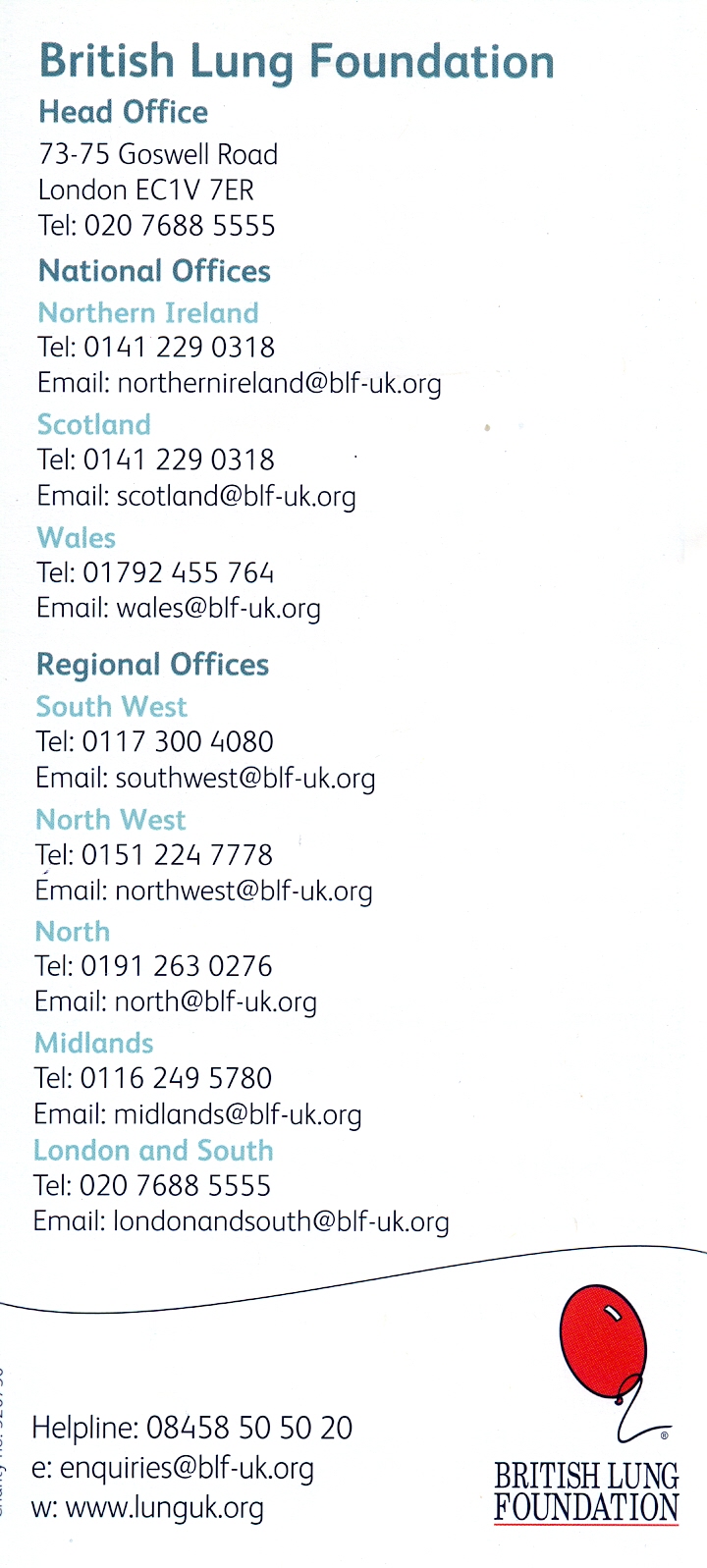Some people become ill after contact with substances which have no effect on most other people. This is called an allergic reaction. Or you can say that the person has 'an allergy' to the substance.
You can have an allergic reaction if you breathe in, eat or have physical contact with the substance you are allergic to. An allergic reaction can show itself in different ways, such as:
- sneezing
- an itchy or runny nose
- red eyes
- breathing problems and coughing
- common skin problems such as hives or eczema
The substances which cause these reactions are known as allergens. Common examples of allergens that affect the lungs include:
- pollen from grass and trees
- house dust mites
- animal fur
Some people - between a quarter and a third of us - have a tendency to develop allergies. This runs in families. However, not all the people with this tendency will actually get allergy problems.
Common allergies
Some allergies can cause problems all through the year; others, called seasonal allergies, only affect us at certain times.
The most common cause of year-round allergy is the house dust mite. These tiny mites, found in every home and work place, feed off the skin which we shed naturally. They are especially common in bedding, such as pillows and mattresses.
Another common cause of year-round allergy is skin and fur from cats, dogs, horses and other animals. These are not just found in places where animals live. Pet allergens are often found in schools - they are brought in from home by the pupils and teachers.
Some people have allergies because of substances that are found mainly at their work, such as certain kinds of dust.
Allergens that cause problems only at certain times of the year include: pollen from trees (springtime), grass (high summer) or weeds (late summer). Some plants may produce mould spores which can cause allergy in late summer and autumn.
How do allergies affect us?
By far the most common allergy in the UK is to grass pollen: it's called summer hayfever, or 'seasonal allergic rhinitis'. Hayfever usually causes:
- itching
- sneezing
- a runny or blocked nose
- sore eyes
- breathing problems
Levels of pollen in the air vary depending on the weather. They can rise a lot on dry, sunny days.
Perennial rhinitis - the so-called 'permanent cold' - refers to the same symptoms which may occur all year round. This is usually in response to dust mites and animal fur.
Most people with rhinitis find that they feel much better if they regularly use treatments like nose sprays and anti-histamine tablets. Your GP or pharmacist can tell you what will suit you best. Allergies can also trigger asthma, particularly in the young and middle-aged. Many people have both asthma and rhinitis. It is important to recognise and treat both conditions, including how to avoid provoking allergens where possible.
Asthma caused by substances breathed in at work can be serious and long-lasting. Some people find they still have it even after they have left work or the substance is removed. It is important to find out what is causing the problem, and to avoid it if possible.
Allergens that can cause lung problems are more common in some jobs than others.
Farmers who work with mouldy hay may be prone to 'farmer's lung'. This is a condition
which can be mistaken for an infection because the symptoms are similar. People who handle birds (including those who keep them as a hobby) can get a form of allergy which affects the air sacs in the lungs.
Remember that most people who do these jobs are not likely to have problems. Up to a third of people have a family tendency to get allergies, and some of them may react to the allergens. However, although conditions such as 'pigeon- fancier's lung' are rare, they may cause lung damage that will keep getting worse until you find out what causes the problem, and then avoid it.
Your family doctor may be able to tell straight away if you have an allergy.
If you have hay fever or asthma which gets worse in June or July, it is very likely that you are allergic to grass pollen. With other allergies, such as house dust mite or animal fur, you may need special tests before the doctor can be sure what the problem is.
It is also possible to have more than one allergy. Some allergies are easier to diagnose than others. Some might need you to see a specialist.
Can I avoid allergens?
It is difficult to avoid pollen, the most common cause of allergy. It may help to wear sunglasses and to keep windows shut, especially in cars or tall buildings. Avoid open grassy spaces, particularly during the evening or at night when there is more pollen at ground level. You will find it helpful to look out for the daily pollen counts in the media. A seaside or foreign holiday during the peak pollen season may help.
If you have a bad allergy to cats or dogs, then it is better not to keep them as pets. Most people might not want to get rid of a family friend, but you should think carefully about it. It does not help to keep the animal out of doors, wash them every week or keep the house very clean.
You can reduce house dust mite exposure by regular cleaning of the house, and by replacing old mattresses. Allow plenty of air in - this will help reduce the dampness the mites like.
Research has not been able to show any benefits of measures some people recommend to reduce house dust allergens. These measures can be expensive, too. They include: the use of 'special' vacuum cleaners and covers for mattresses, duvets and pillows.
Last updated March `06
© British Lung Foundation 2006
As we rely entirely on voluntary donations, every gift we receive is a vital contribution towards our work. There are several ways you can help:
One person in seven in the UK is affected by a lung disease.
Whether it's mild asthma or lung cancer, the British Lung
Foundation is here for every one of them.
This is what we do:
- We Support people affected by lung disease through the individual challenges they will face. Support is the focus of many of our activities, including Breathe Easy, our nationwide support network and Baby Breathe Easy, our parent
support groups. - We help people to understand their condition. We do this by providing comprehensive and clear information on paper, on the web
and on the telephone. - And we work for positive in lung health. We do this by campaigning, raising awareness and funding world-class research.
British Lung Foundation
Head Office
73-75 Goswell Road
London Eel v 7ER
Tel: 020 7688 5555
National Offices
Tel: 01~1 2290318
Email:
Tel: 01~1 2290318
Email:
Tel: 01792 ~55 76~
Email:
Regional Offices
Tel: 0117 300 ~080
Email:
Tel: 0151 22~ 7778
Email:
Tel: 0191 2630276
Email:
Tel: 0116 2~9 5780
Email:
Tel: 02076885555
Email:
Regular gift by direct debit - regular donations are great - they help us to plan for the future.
Sign up for regular cash and raffle appeals - keep up-to-date with our work by receiving regular appeals and taking part in our raffle.
Payroll giving - an easy and tax-effective way of making contributions directly from your salary.
Take part in events - fun and challenging, you can take part in one of our events or organise your own with our support.
Get you company involved - your employer can support you, and us, in lots of ways - from charity of the year, to matching whatever you raise.
In honour gifts - donate an in-memoriam gift or open a Breath of life tribute fund - donations in memory of a loved one are a very personal way to remember someone special. To acknowledge this we have set up the Breath of Life funds as a lasting tribute that allows you to continue to support us in our loved one's memory.
Become a major giving sponsor - please contact the Head of Fundraising on 020 7688 5587.
Leave a legacy - when you make a Will, not only do you have the chance to provide for your loved ones but you can also help to create a better future for those living with a lung condition.
Donate now - you can donate now by completing the form
- 08458505020
This email address is being protected from spambots. You need JavaScript enabled to view it. - lunguk.org
Last updated March '06 © British Lung Foundation 2006
The above information is from a BRITISH LUNG FOUNDATION pamphlet I picked up at my Doctors practice
https://www.blf.org.uk/support-for-you/your-home-and-your-lungs/causes/allergies-in-your-home
The following images are of the pamphlet pages:





